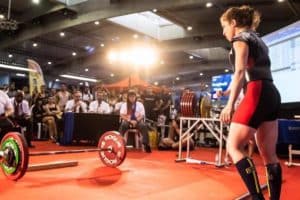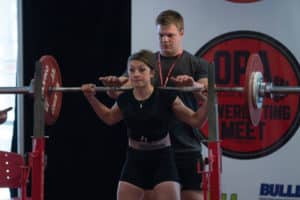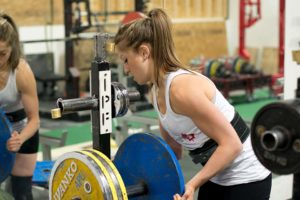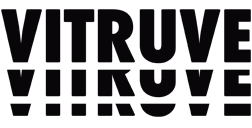23 de January de 2024
The 7 Biggest Mistakes Novice Female Powerlifters Make
The weight room has seen a growth in female attendance, including participation within the formal sport of powerlifting. While stereotypes and barriers for women still exist in strength sports, gone are the days when lifting weights was only seen as a male domain. Strength sports are becoming increasingly popular and participated in amongst women of all ages, abilities, and sizes. Last year in my home country of Canada, over 1/3 of the Canadian Powerlifting Union (CPU) membership was female. As a female lifter myself it is inspiring to see!

The growth of female lifters and participation of course comes with a lot of new female lifters taking interest and entering the sport I still remember my own first time entering a gym and putting a barbell on my back learning how to squat for the first time. Mistakes when training for a sport are inevitable in every sport – learning and the process is part of the fun! However, when it comes to lifting weights, I too often see new female lifters making some critical errors that are preventing them from getting stronger fast.
Trust me, I’ve made the mistakes too. But with over five years competing in the sport (and counting!) including National and International training and competition experiences I may have learned a thing or two and want to share my words of wisdom with you.
Below are some of the key mistakes I too often see novice female lifters make that are holding them back from taking their powerlifting to the next level:
You focus on the weight on the scale, and not weight on the bar
The sport of powerlifting is all about maximizing the weight on the bar you lift. Yet too often I see young lifters stressing about their body weight, and are scared of the number on the scale and the possibility of taking up more space.
In my own lifting, I tried for too long to drop down and stay in a lighter weight class. This resulted in minimal progress, and it prevented me from really benefiting from the training and hard work at the gym I was completing. It wasn’t until I committed to training and competing where my natural body weight was did my strength explode and the plates just kept piling on the bar at an unbelievable rate. Eating to fuel my training ensured I was energized and could give every training session my all. Additionally, not having an extra stress about the weight on the scale also allowed me to put the extra energy towards my lifting. In fact, I soon became even more competitive at the weight class above my own than the one below.
To get stronger, stay injury free, and recover from hard training YOU HAVE TO EAT! Consuming healthy adequate protein, fat, and carbs to fuel your body for training is a must.
While powerlifting competitions include choosing a weight class, I am a firm believer of not dieting down for a competition for the first few years of competing. Instead, focus on the numbers on the bar and being the strongest healthiest version of yourself and compete at your natural bodyweight without any cutting or restrictions. Dieting for too long and maintaining a certain level of leanness can have negative health and hormone implications (especially for the female body!). Not talked about enough in sport is how many females are dealing with long term consequences as a result of trying to maintain too light a body weight for too long.
Throw away the bodyweight scale and start throwing on some weight on the bar you lift.

Nicola competing at her first competitions. She borrowed equipment, and just had fun! She has added almost 100kgs to her squat since then.
You are avoiding heavy lifting
While squatting reps of 12 with a light weight is cute, it is not going to be enough to get strong. To get strong you have to challenge yourself and add some weight to the bar, continuously lifting more than before. You have to not be afraid to sweat, make some lifting faces, get chalk in your hair, be sore, and get out of your comfort zones.
Too often I see girls afraid to load up some weight on the bar and have a battle with it. Instead, they lift the same weight for the same reps and sets every week because it is what is comfortable and easy. Not every heavy rep will be perfect and pretty, but no one ever became a World Champion by playing it safe.
Not only will heavy lifting make you stronger, but I’ve experienced and witnessed countless times how lifting a heavy weight translates to confidence outside the gym and in life. There is something special about achieving a personal record in a lift you never thought you could, that parallels to breaking barriers and achieving big things outside the gym in life that you never dreamed of.
You are not following a structured program
Too often I see girls switching back and forth from the latest Instagram influencer workout, or getting under the barbell at the gym without a plan. While getting to the gym and picking up weights is a good first step, not following a structured program with consistency and proper progressions is holding you back.
Do you want to powerlift and get good at the squat, bench, and deadlift? Then you have to squat bench and deadlift! The majority of your time at the gym should be spent doing these lifts. Your accessories and warmup should also be focused on optimizing these lifts. When you have a program that aligns with your goals, follow it! No skipping days and no slacking off. Even when motivation is low or you’re tired, it is important to show up and get the planned VBT training done.
The best way to ensure you are on the right track on both programming and technique is to hire a coach, or at least find a close knowledgeable lifter with more experience than you at your gym who you can ask questions and learn from throughout your lifting journey. Consistency and showing up day after day is one of the biggest keys to progress in powerlifting.

You spend too much time testing strenght, not building strenght
While one extreme is never going heavy and always playing it safe, another mistake I often see new lifters make is going heavy and maxing out every week. While it is fun to always lift heavy, testing your one repetition max doesn’t build your work capacity and strength. Constantly going heavy prevents you from using proper technique and increases your chance at injury. Have a proper program and following it again is key here, and the program should have you testing / going heavy at regular planned intervals AFTER spending time building strength and improving technique skills.
You invest too much in the details, not the process
Especially for a new lifter, the biggest bang for your buck is putting your money towards a gym membership (ideally a gym with good quality equipment and a great lifting community!), hiring a coach, and investing in long term learning.
If you have the money for it all that’s great. However, if you are on a limited budget it is important to focus your resources at the start where it matters most. Too often I see new lifters spend all their paycheck on the latest fancy brand name squat shirt, and then don’t have the funds to hire a coach to help them improve their squat. It is important to invest in your overall learning and development as a lifter BEFORE purchasing equipment, apparel, and accessories for your lifting.
In my own lifting I started as a student with limited funds, and didn’t have proper lifting equipment until over a year of lifting in the sport. I directed my money instead towards good gyms and meet entry fees, and wore regular cheap runners, and borrowed a belt and attire when needed. I still trained hard, but prioritized my money on the most important things that would advance me in the sport.
Investing your time in learning about the sport is crucial as well. Film your lifts to help analyze your technique and make improvements, train with others, and attend learning opportunities like seminars when you can. I cannot stress enough the benefits of surrounding yourself with other lifters, and training in a positive environment where you are pushed to reach your full potential and kept accountable.
You are waiting to be “strong” before signing up for your first meet
People often delay their first powerlifting meet (or never compete!) because they do not think they are good enough. Trust me, the community, experience, and learnings that will come from competing should always take the forefront to talent.
Working towards a goal will push you in your training like never before, and the unique meet environment will help you gain new knowledge and skills. Every great lifter started somewhere, and you may just surprise yourself at your first platform performance! The meet environment will give you confidence and experience lifting in front of others, keep you accountable to standards, expose you to opportunities, and you will have the opportunity to connect with likeminded individuals. I have experienced and witnessed some of the best friendships result from powerlifting meets.

You forget to have fun
Last but not least (and most important of all!) life is too short to take lifting too seriously.
If you miss a lift it is not the end of the world, and stressing about making everything perfect every day is not worth it. Instead, smile more during your sessions, make friends, and be open to learning and improving. I guarantee you having fun is what will keep you in the sport for the long run, and your best training sessions will be when you are enjoying your lifting.
If you want to learn more about sport science, vbt devices and how to improve your training routine. We have lots of articles that can help you achieve your goal. If you have any questions, don’t hesitate to ask! Leave a comment or contact us here.

